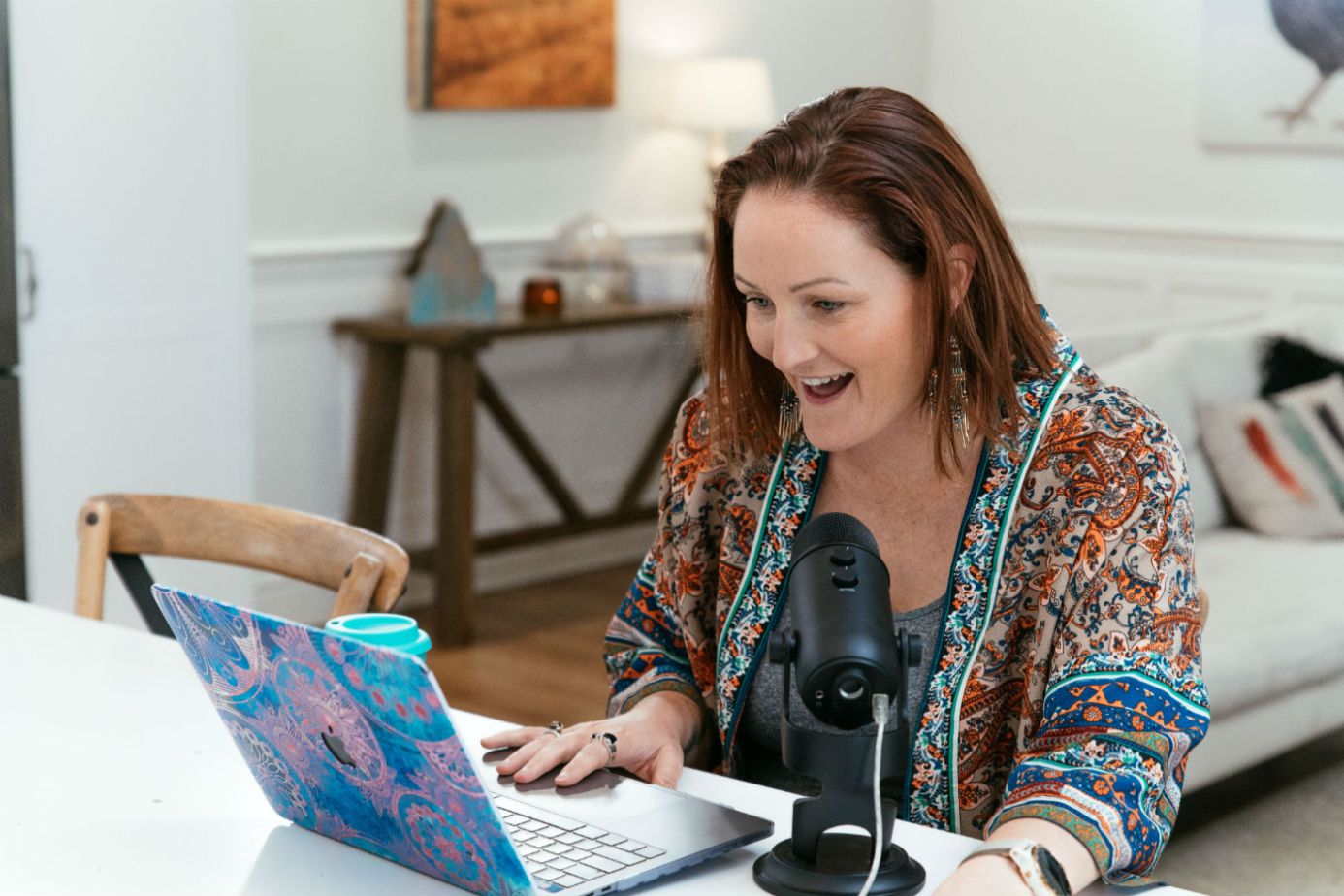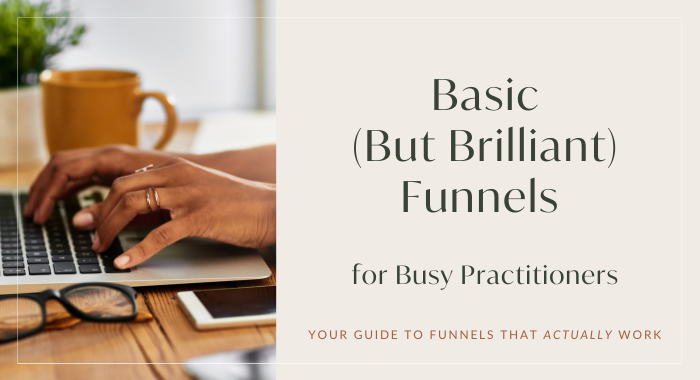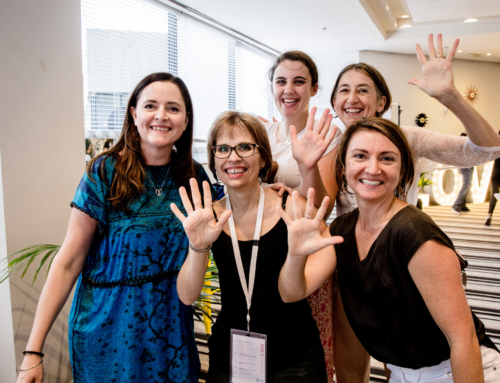Welcome to the Natupreneur Movement! I’m excited to welcome back Carla Wrenn who is sharing how systems can revolutionise your practice. Carla is an amazing practitioner with an extraordinary practice. She hosts thousands and thousands of clients in her local area and across Australia. She is also an incredible mentor, speaker, and contributor to the naturopathic profession here in Australia and in New Zealand.
Systems can revolutionise your practice
T: I am excited to talk to you today about one of the things I think we don’t talk about enough. I think it’s a bit of a game-changer when you cotton on to it to create flow in your practice. We’re going to talk about systems.
C: Excellent. I love systems!
T: I love systems, too. Was there ever a point in your practice that you didn’t have systems?
C: Yeah, definitely. I think like everyone when I first came out from college (I’ve been graduated about 18 or 19 years now), you just kind of go and replicate what you were told to do at college. That works for a while. But I find, certainly for myself as the cases became more and more complex, which inevitably, I think they do as you practice for longer.
And also with the state of chronic disease in Australia, I felt like I didn’t have the capabilities to properly get to the bottom of my patients’ real causes and drivers for their illnesses. And that was when I started to think about well, what more can I get to get those systems in place? So I can really present to the patient and myself through this storey what’s going on for them?
T: Yeah, I remember coming out and I had a head full of facts, figures and knowledge. But sitting in front of somebody who’s telling you their life story and not knowing which bits are important, all these polypharmacy, and a whole bunch of other stuff. And then you’re supposed to fit it into a 60-minute consult that blows out to nearly two hours in the beginning, you’re not quite sure what to look at.
One of the biggest things that changed the way I practice is having a flow and having a system of proper clinical questioning so that there weren’t gaps in what I was receiving from the client. And so that I could put in a bit of work that was really specific to what they were having a problem with right there and then, rather than prioritising something else.
A system to manage consults
C: For sure. I think sometimes we may come, we feel like, “Oh my goodness, I’ve got so much to get through in that initial consultation.” And like we said, it can blow out in time. But I also think the flip side of that is that it’s really depleting and exhausting for patients who usually aren’t coming to us on their best days, to have to dredge up all that stuff. So if we have a system that kind of fine-tunes the direction we need to take the consultation, it can be less overwhelming and exhausting for both parties.
T: Yeah, totally. So I am an absolute lover of your system, which is Vitae Mosaic. For those people who have never been exposed to Vitae Mosaic, what is an overview of what it’s all about?
C: Yeah, sure. So essentially, during this time as my clinic was developing and the type of patients I was seeing grew, I realised that I had these gaps. I looked at other practitioners overseas that were doing things that I was interested in, who were treating the kind of cases I was getting.
And through that, I found the Institute for Functional Medicine, which got me engaged in working in the area of functional medicine through some of the training that I did. And when I came back to Australia, I incorporated what I learnt there with how I was consulting in Australia.
Reducing overwhelm and stress
And, you know, made this system that works for me to better address complex cases, so that I didn’t feel as overwhelmed and I didn’t miss things. And so that I had a really great way of representing to the patient, the things that are in our head as practitioners.
You know, we know that what happened to them in utero with their mom, or in the first few years of life, or even in their childhood, or perhaps traumas later on, that could have happened 10 years before they got this complaint could all have something to do with their presenting complaint. So I think Vitae Mosaic gives them really graphical, very visual tools to understand naturopathic – or nutritional medicine, herbal medicine, whatever your modalities – and how functional medicine can play into that. So that the patient and the practitioner get a better outcome throughout the initial consultations, and then also the subsequent consultations.
T: I love that. I’m super excited that you’re coming to NatEx to give us a bit of a deeper dive and workshop on the VIP day as well. But for those people who haven’t experienced it yet, if we were just going to go top level with the flow of what a complex consultation would look like. I know that it begins with clinical questioning. What happens after that, after the clinical questioning side of things? We’ve actually had a previous interview about this, and you can check it out on YouTube. If you haven’t, just Google my name and Carla’s name. You can check out our last interview on how to use timelines to really gauge what’s going on and what is happening in a complex case and how it’s actually evolved over time.
So you’ve got clinical questioning and quizzes and other bits and pieces that we can utilise as practitioners. Then you’ve got timelines. What else comes with that?
Graphical tools help both practitioner and patient
C: Yeah, so the timeline is followed by a section that is called the Mosaic Spectrum, which is basically a graphical tool that enables us to work out what areas of the body to prioritise. They are loosely systems, but some of those systems are in the terminology that I use, including things like ‘energy,’ ‘inflammation,’ etc.
So it’s not the classic symptom systems that you would think of like the gastrointestinal system. We break the case apart using this mosaic spectrum. And then we look at the clinical guide, which is a resource that I’ve developed over my career, but also with the help of all the 250 or so Vitae Mosaic graduates who have all had input on that now.
That means that we have ways of assessing the patient using a number of different assessment tools. From things like physical examination through to generalised questionnaires, condition-specific questionnaires. You can use them to assess the patient and also track the patient.
And then looking at things like standard percent of pathology, or in-clinic testing, functional pathology. So you’ve got a really good idea of what you think are the causes but also the nail down, drill down version of how we can substantiate that for the patient. And your records to monitor where they are now and where they going to as you do your treatment.
Encouraging patients to come back
T: Awesome! One of my favourite gold nuggets that I always employed in my practice was one of the reasons I had so many clients coming back. I know so many of our listeners have a little bit of a hiccup when it comes to getting the clients to come back in. And that is actually tracking client results. Not only pathology results, and I have a thing for pathology given that I had a decade in pathology before I became a naturopath.
But having baseline pathology and then being able to track it shows somebody with real data what’s happening. Also in the Vitae Mosaic model, checking in with symptomatology, and tracking what’s happening for them, for instance in their energy, fatigue, or whatever their presenting complaint was. So they get to actually look forward to coming back and checking in with you to see how those things are going along with real data.
C: Yeah, I think the data makes a huge difference. And, you know, I definitely think the blood tests play a big part of that in my practice as well. But having any kind of assessment question. I really love the desk 21, which anyone can download and use.
When a patient first comes in and talks about having anxiety and depression, – you know, I had one today – you really want to measure where they’re at. Because every patient has a different variation of that. Not only does it help to target treatment, but it helps to treat the cause, and also monitor that they are progressing.
Showing patients their progress with real data
Because particularly in groups of patients who have chronic disease, I find their ability to assess how they are improving is sometimes a bit warped. They feel like they’re improving slower than they expect. They might even come into a consult room and say, “I don’t feel any better.” It really helps if you’ve got some things that you can refer back to.
A typical one I will use in every consultation is energy, sleep, mood, and a bit of a measure. You know, just a simple scale for energy with 1 as the lowest and 10 as the highest. Where do you feel today? Last time, they may have said they feel 3 out of 10. And this time, they feel 8 out of 10. But they haven’t equated that to you what you’ve done for them because maybe they’re presenting complaint is something different.
So I think any tools you can use to track give better outcomes. Because when you’ve shown that data to them, they leave with the feeling of, “Oh my God, I got so much out of the treatment she’s given.” After they just walked in the door thinking nothing’s changed.
The Mosaic Spectrum particularly highlights how a treatment that they think they’re just receiving for inflammation, or energy, or gut can have an impact on a whole lot of other areas of the system. And they can start to see how we don’t have to make heaps of changes or take heaps supplements to start to see the whole body improve, not just the thing that came in for initially.
T: Yeah, absolutely. I remember a client coming in having had migraines for an entire life. Headaches were her way of life. But she had come in for her immune system. So we were working on whole-body inflammatory conditions, a whole bunch of other stuff. When she came back in, the only way that she even remembered she had headaches, even though she’d had them her entire life was because we were tracking them out of 10. She came back in and she was persistent on this recurrent cold that had come up, but she hadn’t experienced a headache for over six weeks.
Celebration as a system
C: Totally. We actually have a celebration within our practice. We’ve got seven naturopaths and we all celebrate together those wins. Because we often joke about, “I had a gentleman who had prostatitis and he had been going to the toilet 13 times a night. I asked him about it after about a month of treatment, and it was like he’d never had the problem!” And I’m so excited because he’s now sleeping through the night or getting up just once or twice. He’s not at all excited that he’s 13 weeks. It’s almost like he expected that to happen. But that is such a big change.
We know how much it takes in the body to get those kinds of changes to happen. So we actually celebrate them amongst the practitioners because sometimes we feel like the patient just doesn’t appreciate how amazing that is. Like you said with the migraines, it was their whole life! But they forget that once it’s better.
T: I love celebrations is a system within practice as well. I think celebration and acknowledgement is a completely underrated thing. It pushes many a practitioner into burnout or into the go-getter mode of doing being more and feeling behind. But when you actually stop to acknowledge and celebrate even the smallest of things, it just really perpetuates you showing up even better for yourself and your clients.
Celebrate both big and small wins
C: For sure. We do that every staff meeting that we have. We don’t have heaps of staff meetings. It’s not a weekly or monthly thing, it’s just when it’s appropriate. We communicate otherwise throughout the month, of course. But when we do have one, the opening question I always ask is, “What is your greatest win for the recent period?”
And that win might not even be related to work. Because sometimes we have to think of ourselves not just as a practitioner, but also the person who’s getting to work. Sometimes that needs to be celebrated in itself. We always start with that and sometimes it’s the smallest things, sometimes it’s huge amazing things like getting rid of someone’s lifelong migraines. I definitely think talking about and celebrating those things changes the way we feel about ourselves on the days when things aren’t necessarily going as we expected they would.
Love Your Work, Love Your Life, Love Yourself
T: I couldn’t agree more. This is a great segue into the other thing I wanted to talk to you about. The theme at NatEx 2020 is ‘Love Your Work, Love Your Life, and Love Yourself.’
Because, as you were just explaining, the person that shows up to work is an entire whole self that shows up to work, not just a one-sided practitioner. I know that you love so many aspects about your work including your staff, your practice, your amazing dispensary. I saw some amazing Instagram pictures of a recent trip you took over to Europe and your inspirations for your apothecary. But what about on the self-care side of things? I’ve been asking many of the practitioners that have been on the podcast.
Managing burnout
How do we look after ourselves as praccies? Have you ever experienced burnout? And what did you do to get out of it?
C: I haven’t ever experienced burnout through work. I definitely experienced some level of burnout with my three-month-old baby, and I don’t even want to go back there. So I think for me, work became an escape from the challenges that I faced as a mum of two children. So for me for a while work was actually the self-care. But then as my practice grew, and as things kind of evolved, obviously, there’s a certain amount of responsibility with having the dispensary and all that that entails, and the kinds of cases that I take on.
One of the biggest things that I’ve learnt – and it’s actually more recently – is that I have to take a big step back and rationalise how important the things I’m worried about and stressing about really are in the scheme of things. I remember a quote from NatEx this year that your Murray said, which really struck me. He had said to you, “Every minute that you’re with your patients running late, staying back helping them, is less time with your family and the loved ones at home.”
And that really got me in the nasty kind of place where you don’t want to talk about the icky feelings. I do prioritise my work over things. Well, I have prioritised my work over a lot of things. I’m really lucky to have a super supportive husband so don’t worry, my children aren’t neglected.
Doing less leads to more
I’ve really learned this year, especially, that doing less actually gives me a lot more in the business. Both on a mental-emotional level, a work level, a patient number level, and also on a financial level.
So you mentioned my trip – that was a huge goal for myself, to be able to surprise my husband with a European holiday for his 40th birthday. By doing that, I’ve actually felt like the business has grown. And I think that’s because the energy has shifted a little bit. I think the universe…funny things happen. So, self-care is evolving for me. Travel for me is a massive one, going overseas is a huge reality check for me. And I immediately come back in a completely different headspace able to see the things that I’m stressed about that actually aren’t worth stressing about, and where to actually put more energy in to get better outcomes.
T: Well, I can definitely attest to this. There’s a reason that I take groups of our praccies overseas, to really take them out of their environment, out of that headspace, and really clear up opportunities and see other creative possibilities coming through. If you didn’t just catch that gold nugget of doing less is actually me giving more. That was amazing and it’s one of those ones that hits you in the feels, as well.
Delegate, automate, eliminate
If you’ve ever gotten to that stage of business where you’re just doing all of the things and feel like you’re not getting anywhere, often the case is that doing less in your business – either by delegating, creating systems to automate, or eliminate it – creates more. More:
- of you shows up
- possibilities show up
- for your clients
- energy
- for your staff
It really is one of those things that must be a lived-through experience to get it. Then once you’ve got it, you can’t unsee it or undo that feeling. It’s a lot like pulling back an arrow to shoot forward even further. You’ve got to really slowly pull it back and then release it.
C: I think it is a funny mindset. I have a friend who is in the restaurant business, so completely different. But obviously, a business owner with the same kind of challenges on some levels. She wrote a blog recently, which is one of those ones that kind of hits you in the same spot. And it’s it was about you know, she had multiple restaurants. The dream and success of restauranteurs is the idea of multiple venues. She wrote these really thought-provoking posts about the fact that perhaps we need to think of success as when all your ducks are in a row and the business that you have is running as best as it can, humming along at that perfect level.
For me, with all the systems in place and all the boxes ticked, that was the real goal shift. Because I certainly thought, “Let’s multiply and have more dispensaries and more this and more that.”
Reevaluating what success means
I think it may not be about more businesses or more practices. It may be about more patients for you. But I think always reflecting and looking back at the patients that you do have and how you can better serve them. Rather than rushing forward, needing more patients, needing more everything. I think perhaps we can flip that around and think about it as a different way that might serve as well to look after ourselves too.
T: I agree that hitting the ‘more’ on that really shallow angle versus creating systems and processes to hit on a really deep connection. I have seen that personally in my practice. That was the driving force behind so many people that were helped in such a deep way and transformative way. Yeah, I couldn’t agree more with that.
So, we are going to see you at NatEx 2020 on the VIP day, which is sponsored by MediHerb. We’ve got all these amazing workshops! We can’t wait to hear your insights when it comes to a deeper dive into these systems to make sure that we are helping on that deep transformative level for our clients. And I can’t wait to see you in the ball pit.
C: Oh my god, I’m so excited about so many things! I feel like I’ve been stalking the pages and looking at all the other amazing speakers, as well. So yeah, I’m very excited to be there at the VIP day. And of course, to just get the whole vibe because last time was amazing.
T: Yeah, I can’t wait! Thank you so much, Carla, for sharing your nuggets of wisdom.
Take action
If you are a praccie who got something out of this (I surely did!) or feel like you know someone else you might get something out of it, don’t hesitate to share this episode or hit subscribe.
If you haven’t already, go and check out the Natupreneur Experience and you will see Carla and many more speakers lined up ready to share their wisdom at NatEx 2020 and we’ll see you there!
Free Resources
Thinking about taking your business online? Make sure you have all the essentials you need to successfully transition to online consults and a virtual practice covered with my How To Pivot Online Checklist.









Leave A Comment